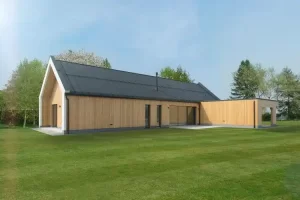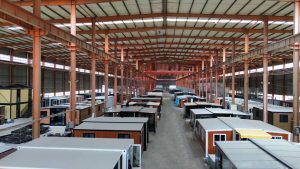In the technological wave of the 21st century, digital transformation has become an irreversible trend in all walks of life, and the construction industry, as an important pillar of the national economy, is particularly notable for its transformation path. In this context, prefabricated houses (also known as assembled buildings), with its high efficiency, environmental protection and sustainability, has become a model of digital transformation in the construction industry, which not only profoundly changes the traditional construction mode, but also promotes the upgrading and innovation of the whole industrial chain.

Click to learn more about prefabricated houses
Prefabricated House: Definition and Characteristics
Prefabricated house, in short, refers to the main components of the building (such as walls, floors, roofs, etc.) in the factory in accordance with the design requirements of the pre-production, processing completed, and then transported to the construction site, assembled through a reliable connection into the form of construction. The core of this construction method lies in “prefabrication” and “assembly”, which realizes the transfer of construction production from the site to the factory and greatly improves the construction efficiency and quality control level.
The characteristics of prefabricated houses are mainly reflected in the following aspects:
Efficient construction: factory production reduces on-site operation time, shortens the construction cycle, and improves construction speed.
Quality control: In the factory environment, the production conditions are stable, which is conducive to the implementation of strict quality control standards to ensure building quality.
Environmental protection and energy saving: Reduced on-site wet work reduces material waste and noise and dust pollution. Meanwhile, prefabricated components often use more environmentally friendly materials and technologies, which is conducive to energy saving and emission reduction.
Cost saving: Scale production reduces the unit cost, plus shortens the construction period, reducing labor and financial costs.
Design Flexibility: Prefabricated houses are not restricted by traditional construction methods, allowing for more diverse designs to meet individualized needs.
Driving force for digital transformation
The reason why prefabricated houses can become a model for digital transformation in the construction industry is inseparable from the following key driving factors:
Technological progress: The application of advanced technologies such as 3D printing, BIM (Building Information Modeling), Internet of Things, and big data has provided strong technical support for the design, production, transportation, installation, and post-maintenance of prefabricated houses, realizing the digital management of the whole chain.
Policy support: In order to cope with climate change and promote the development of green buildings, governments have introduced a series of policy measures to encourage prefabricated buildings, including subsidies, tax incentives, standardization, etc., which creates a favorable external environment for the popularization of prefabricated houses.
Market demand: With the acceleration of urbanization and demographic changes, there is a growing social demand for fast, high-quality and low-cost housing, and prefabricated houses meet this market demand with their unique advantages.
Industry chain synergy: The development of prefabricated houses promotes the close cooperation between upstream and downstream enterprises, forming an integrated industry chain of design, production, construction, operation and maintenance, which improves the overall efficiency and competitiveness.

Future Prospects and Challenges
Although prefabricated houses have made remarkable achievements in the digital transformation of the construction industry, their future development still faces a number of challenges, including how to further improve the degree of standardization in order to reduce production costs, how to optimize logistics and transportation in order to reduce energy consumption, and how to enhance the public's awareness of the safety of prefabricated houses.
In the future, the development of prefabricated houses will pay more attention to technological innovation and integration, such as using artificial intelligence to optimize design solutions, ensuring the transparency and traceability of material sources through blockchain technology, and developing smarter building management systems.
At the same time, strengthening international cooperation and sharing technical achievements and market experience is also an important way to promote the globalization of prefabricated houses.
In conclusion, prefabricated houses, as a pioneer in the digital transformation of the construction industry, not only show the infinite possibilities of technology to change life, but also provide practical solutions to realize the goal of sustainable development.
With the continuous progress of technology and the growing maturity of the market, prefabricated houses will certainly play a more important role in the future construction field and lead the construction industry to a new era of more efficient, green and intelligent.
If you are interested in purchasing a prefabricated house, please contact us!
E-mail address:uwantvlink@gmail.com
Telephone:+86 189 1339 1366
Post time: 11-12-2024







